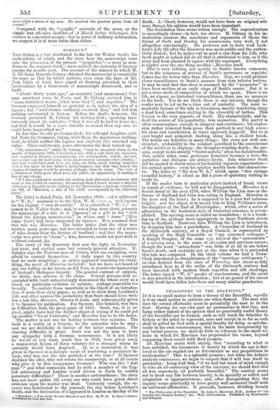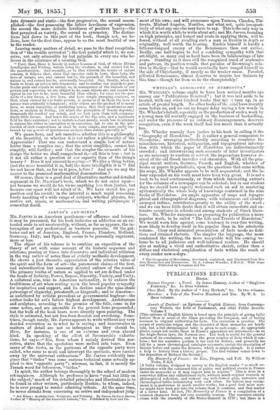PHILOSOPHY OF THE BEAUTIFUL. * IF it is no small matter
to form a theory of the Beautiful, equally is it no small matter to criticize one when formed. The man who does the second effectually must be potentially the man to do the first. Having for our own part no pretensions in that line, and being rather indeed of the opinion that no practically useful theory of the beautiful can be formed, such as will teach the beholder to fathom or the artist to represent, save and except in so far as each shall be gifted by God with a special faculty for doing so satisfac- torily to his own consciousness, but in the main inexpressibly by any verbal process, we shall do little in reference to the small vo- lume in which Dr. Macvicar has propounded his views, beyond comparing their result with their promise.
Dr. Macvicar starts with saying, that "according to what is here unfolded, the lineaments of beauty by which the eye is flat- tered or the ear regaled are as determinate as any propositions in mathematics." This is a splendid promise ; but when the definite analysis commences, we begin to suspect that it will lose itself in generality ; being ;old that, " if we had but reach of mind enough to take an all-embracing view of the universe, we should find that all was supremely, all perfectly beautiful." The context seems not to draw any line between beauty, to be specially so called, and adaptation or appropriateness; and, after disregarding this, the inquiry seems practically to have pretty well answered itself with an universal affirmative. It proceeds, however, dividing beauty
• The Philosophy of the Beautiful. By John G. Macvicar, D.D., Author of "An Inquiry into Human Nature," &c. With Illustrations. Published by Edmonstou and Douglas.
into dynamic and static—the first progressive, the second accom- plished—the first possessing the loftier loveliness of expression, the second the more definite loveliness of positive beauty—the first perceived as variety, the second as symmetry. The distinc- tions laid down in this part of the book, though not, we be- lieve, here for the first time, appear to us the most fruitful of use to the reader.
Leaving many matters of detail, we pass to the final recapitula- tion of "the results arrived at "; the first poingof which is, we con- ceive, not only admissible by but palpable to every one who be- lieves in the existence of a creating God.
" First, then, there is beauty in nature because of God, of whose Divine Intelligence and Feeling, nature being the creature, is, and cannot but be, the manifestation. And secondly, as to that wherein the beauty of nature consists, it follows that, since God operates only in laws, these laws, the laws of nature, are, and cannot but be, the grounds of the beautiful, and nature is, and cannot but be, universally beautiful. But, thirdly, when we begin to break up nature into fragments, and to confine our regards to par- ticular parts and objects in nature, as, in consequence of the finitude of our powers and capacities, we are obliged to do, some objects are, and cannot but appear in our eye to be, more beautiful than others ; for some are the pro- ducts of a few forces, a few laws, and have simple sweeping contours, so that, when viewed by our finite powers, it seems as if in them the laws of nature were evidently triumphant ; while others are the product of so many laws, so many conspiring or conflicting forces, that their spontaneous ana- lysis, or analysis in feeling, (on which the perception of beauty depends,) transcends the reach of our minds, and we look upon them with compara- tively little favour. And hence the origin of the fine arts, and a legitimate field for their existence ; not to imitate nature merely, much less to attempt to surpass her either in conception or in execution, but to aim at the pro- duction of such compositions as shall be more simple, and more easily em- braced by our powers of spontaneous analysis than nature generally is."
We pause here, and ask ourselves whether this is a philosophy of the Beautiful, or whether it is not rather a philosophy of the Appreciable? That one can understand a simple law of nature better than a complex one ; that the artist simplifies, cannot but simplify, still further ; and that the simpler the elements of his design the better we shall comprehend it,—all this is true : but is it not all rather a question of our capacity than of the thing's beauty ? Does it not amount to saying—" We like a thing better, (not the more beautiful it is, but) the more intelligible it is "? Did we not know that, as far as it goes, before ? And are we any the nearer to the promised mathematical demonstration ? Of course, there is a good deal of illustrative matter and detailed argument in Dr. Ma.evicar's book, which we do not enter upon— not because we would do his views anything less than justice, but because our space will not admit of it. We have stated his pro- position and his result : in the interval is much rapid reasoning, hardy handling of a wide range of subjects, whether physics, for- mative art, music, or mathematics, and writing picturesque if somewhat florid.



































 Previous page
Previous page